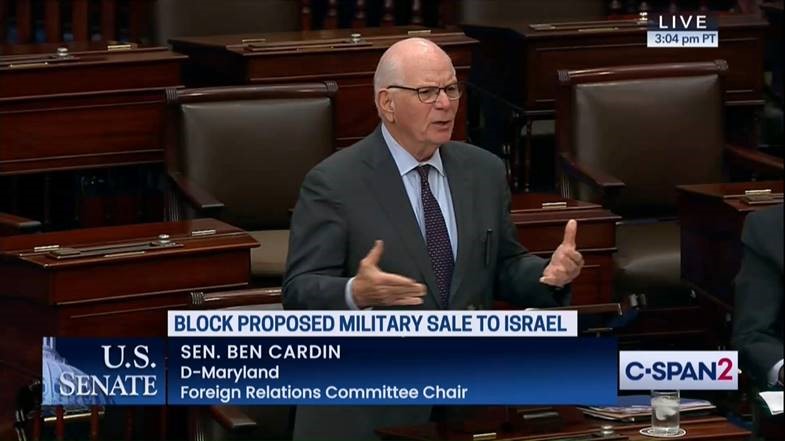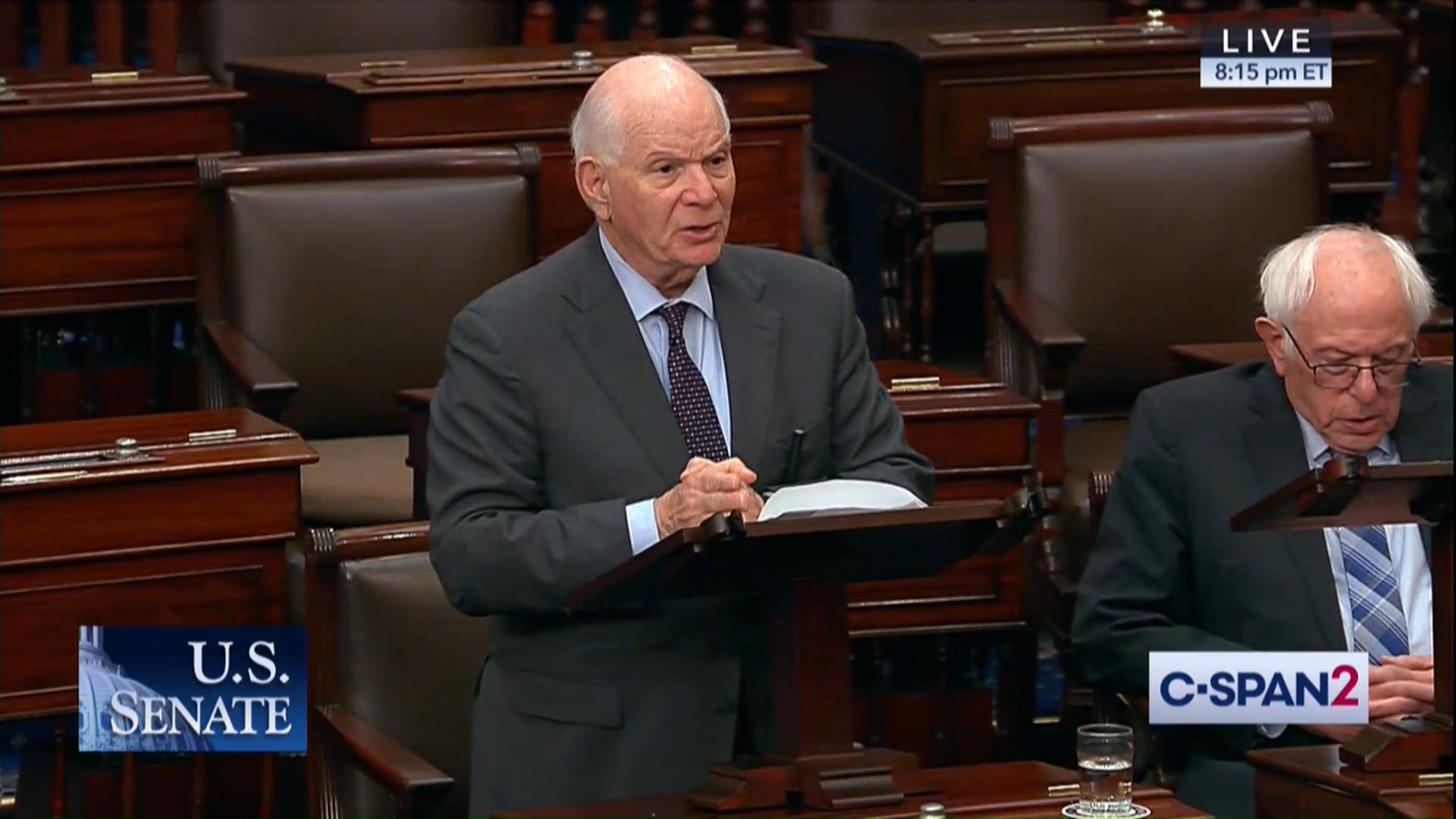Chair Cardin Speaks in Opposition to Blocking Weapons Sales to Israel
WASHINGTON – Today, U.S. Senator Ben Cardin (D-Md.), Chair of the Senate Foreign Relations Committee, spoke on the Senate floor in opposition to the Joint Resolutions of Disapproval (JRD) to block U.S. weapons sales to Israel.
WATCH THE CHAIR'S REMARKS HERE
A copy of the Chair’s remarks, as delivered, have been provided below.
Over the past year, we have used our voices and influence to press for the protection of civilians in Gaza, for access to vital humanitarian assistance, to bring home the hostages, and to end this conflict. We all know that it's our responsibility to do more, Israel's responsibility to do more, and the international community's responsibility to do more to protect innocent victims.
But even as we work to address the humanitarian crisis in Gaza, we must be clear about our long-standing bipartisan commitment to the State of Israel. It's been the bedrock of our foreign policy in the Middle East, a special relationship that was established in 1948 when President Truman… but against the advice of his State Department, President Truman recognized the State of Israel immediately after the United Nations vote. And that special relationship is based upon two countries, Israel, and the United States – both democracies, shared values. We share intelligence information, military information, and much, much more. That special relationship is important to Israel, and it's important to America's national security interests. We both benefit from it.
Part of that special relationship is that United States is committed to making available to Israel the military arms it needs in order to defend itself from the dangers in the region. We have mutual adversaries – Iran and its proxies, Hamas, Hezbollah, the Houthis and many others. The threats are real. The adversaries are not just Israel's adversaries. They are our adversaries.
Now to the three resolutions that we have before us, and how does that relate to this issue?
Senate Joint Resolution 111 deals with tank munitions. Now these tank munitions have a delivery date three years from now. These are replenishments. This is so Israel has the capacity to defend itself against the future threats that we know are in the region, that are real. It's not engaged in the current conflict in Gaza or Lebanon. It’s for Israel's ability to defend itself against the threats that are real in the region.
Senate Joint Resolution 113: mortar munitions. Delivery date: about a year and a half from now. Again, it's the replenishment of their supplies. It’s to make sure that they're not caught in a situation where they can't defend themselves against future threats. This is the wrong vehicle for expressing ourselves in regards to the conflict that exists today. But if we are going to talk about the conflict that exists today, then the spotlight should be on Hamas, not Israel.
The third resolution – Senate Joint Resolution 115: the JDAMs. This one I really don't understand. These are precision kits that go on munitions. They're not the munitions themselves, and without the JDAMs, the precision of the munitions is not as great. What does that mean? It means it has a much higher likelihood of missing the target, collateral damage, civilians killed and injured. So, it's counterproductive to the safety of the communities. I don't understand why we would want to prevent Israel from having the technology to have precision use of its munitions. To me, that makes no sense at all.
But as I pointed out, the spotlight should be on Hamas. Why are we in this conflict? October 7, the brutal attack by Hamas. We don't hear a lot of talk about that. The hostages. We talk about the release of the hostages, they never should have been taken. Where's the outrage in the international community? Where's the outrage here about Hamas holding hostages, some of whom are Americans? That's where the outrage should be. Hamas uses human shields. Yes, we bereave the loss of innocent life. But Hamas makes it much more likely there's going to be the casualties of innocent life. They embedded themselves in hospitals and universities and make it so much more difficult for Israel to conduct a military campaign. Why isn't the focus on the terrorists?
And then there's humanitarian assistance. We've heard from our own State Department people as recently as today, that the challenges for humanitarian assistance is made so much more difficult because of Hamas is using it as a weapon to deny its own people humanitarian help, making it extremely difficult for the deliveries to take place.
So, I am somewhat confused. I don't understand these resolutions as furthering the cause for what the sponsor has indicated. The sponsor says that he disagrees that blocking these offensive arms sales will only embolden terrorist organizations such as Hamas and Hezbollah, as well as their sponsors in Iran. But if the U.S. Senate fails to provide the support to Israel now, what else would our adversaries believe? This would be a sign of weakness and our resolve to fight the terrorism in the region. It would be a gift to Iran.
And let me talk about the cost. You hear a lot about taxpayer costs. Canceling these contracts, they have cancelation clauses. This will cost the taxpayers money, not save the taxpayers money.
But I want to talk lastly about the timing of this. Let me quote from the message we received from the Biden Administration: “These resolutions are particularly untimely and counterproductive as we are working to secure a ceasefire in Lebanon. U.S. officials are in Beirut now working to finalize this deal – a deal that is only possible because of the military pressure Hezbollah is under. Disapproving arms purchases for Israel at this moment would jeopardize those talks and put wind in the sails of Iran, Hezbollah, and Hamas at the worst possible moment.”
These resolutions should be defeated. As the administration has said, we urge you to oppose the JRDs – which will prolong the wars, not shorten them, put Israel at risk, and inject wind in the sales of Iran and its proxies just as they are facing a historic low point and looking for a deal. I urge my colleagues to reject all three of these resolutions. Let us continue to work together for peace in the Middle East. Let us work and isolate the terrorists in the region, Iran, and its proxies. Let's work with our allies and partners in the region to do exactly that. Let's not make the matter worse by calling into question our commitment to make sure Israel has what it needs to defend itself against the future threats that are in that region.
_______________
WATCH THE CHAIR'S REMARKS HERE
A copy of the Chair’s remarks, as delivered, have been provided below.
In opposition to the resolution.
Quite frankly, I'm perplexed with this one. As the sponsor indicated, we are talking about the guidance systems on munitions, which makes it precise. Despite what the sponsor of the resolution says, Israel targets military targets of terrorists. Yes, Hamas makes them more challenging by where they locate the targets – in hospitals and schools, etc. But without the guidance system, there's going to be greater civilian losses.
So, if you're concerned about humanitarian issues, I don't know how you can possibly vote for this resolution.
In addition, of course, as the administration pointed out, they oppose this resolution because it would prolong the war — not shorten — put Israel at risk, and inject wind into the sales of Iran and its proxies, just as they're facing a historic low point and looking for a deal.
I urge my colleagues to reject the resolution.
###

